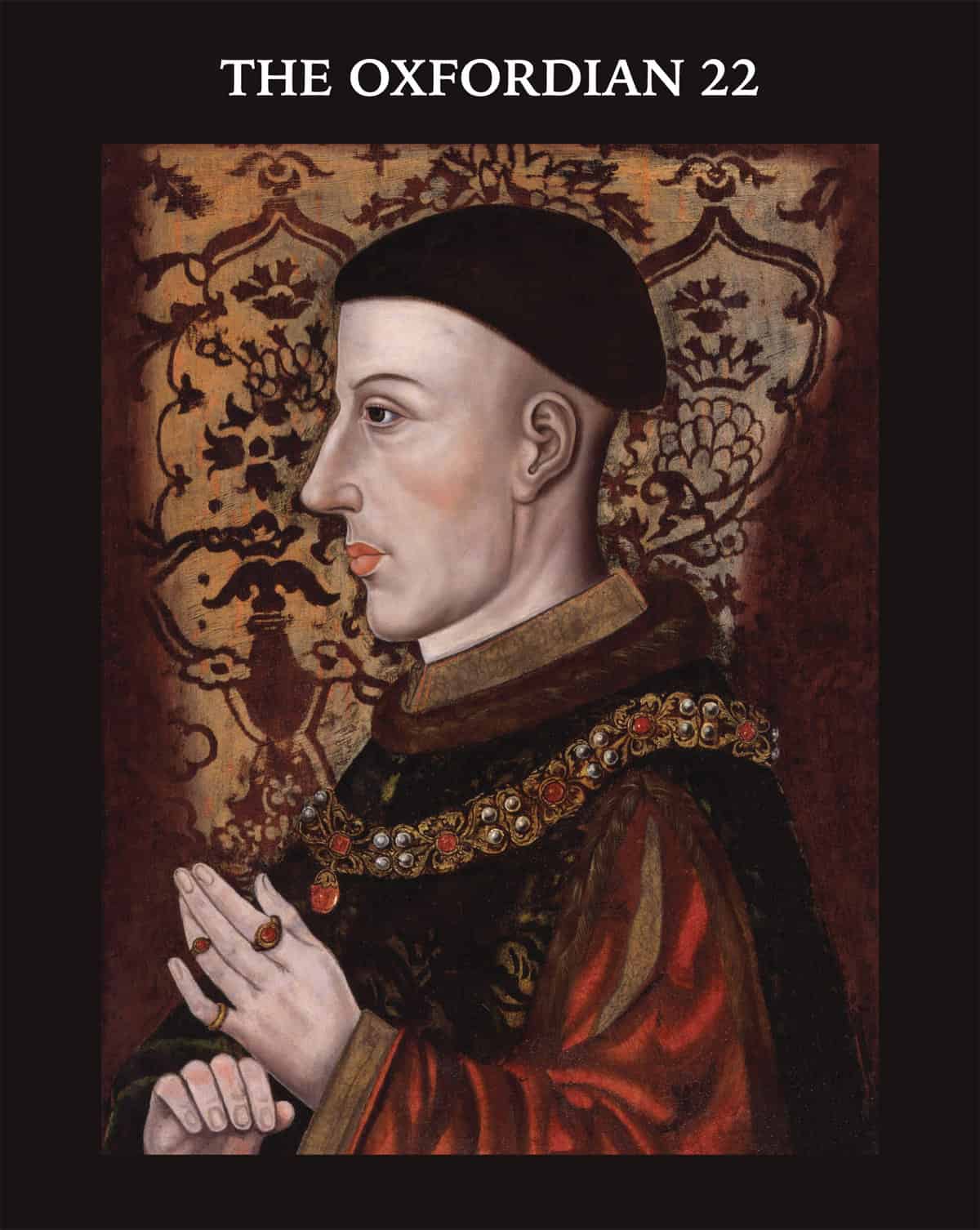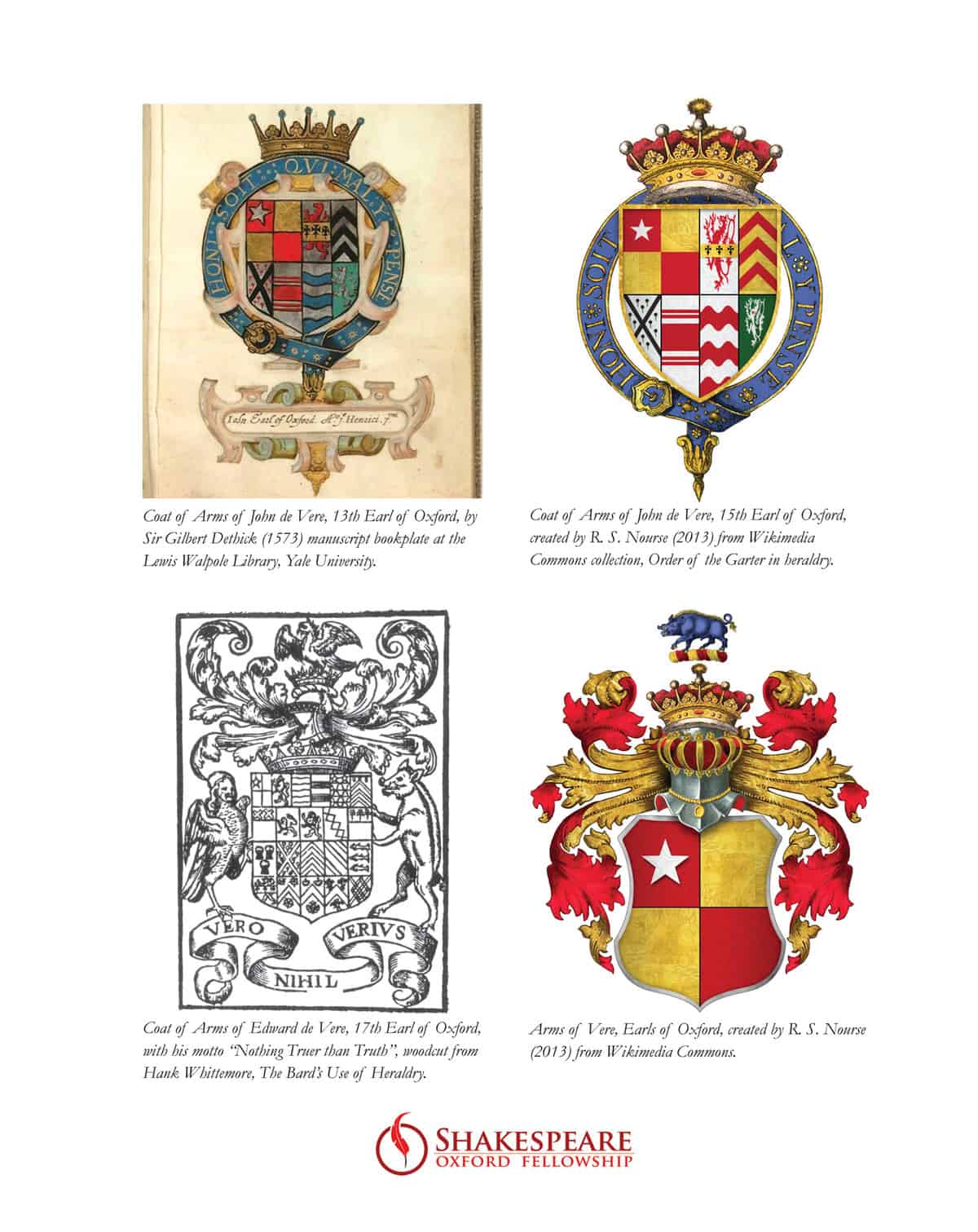 Newest Annual Volume Notes Academic Advances by Oxfordian Scholars and Shows That Shakespeare’s First Play Dates to the 1560s
Newest Annual Volume Notes Academic Advances by Oxfordian Scholars and Shows That Shakespeare’s First Play Dates to the 1560s
The latest issue of the Shakespeare Oxford Fellowship’s peer-reviewed scholarly journal, The Oxfordian, has been published. The 22nd annual volume is 190 pages long, contains 13 new research papers, essays, and book reviews, and is illustrated throughout.
Volume 22 is available in print on Amazon for only $9.99. Earlier volumes also available on Amazon are No. 17 (2015), No. 18 (2016), No. 19 (2017), No. 20 (2018), and No. 21 (2019). Volume 22 is also available in pdf form to fellowship members on the SOF website. Selected parts of the new volume, and past issues up to Volume 21 (2019), are freely available in pdf to anyone on the website.
The leading article in this volume is by historian Ramon Jiménez, who demonstrates that William Shakespeare’s first play was The Famous Victories of Henry the Fifth. Read more here about this breakthrough study, which should compel literary scholars to identify the author “Shakespeare” (Edward de Vere, 17th Earl of Oxford) as the writer of this play (published anonymously in 1598), and should lead to a scholarly reassessment of the consensus that the author did not revise and enlarge upon his early works.

The front cover of Volume 22 (above) showcases a contemporary portrait of the historical King Henry V, while the back cover (at left) presents four different coats of arms of de Vere Earls of Oxford.
This issue of The Oxfordian reviews three books by university-affiliated academics published during the last two years by respected academic presses: Cornell University Press (via its imprint Northern Illinois University Press), Palgrave Macmillan, and Guernica Editions.
All three academic authors — Donald Ostrowski, Ph.D., historian and lecturer at Harvard University Extension School, Sky Gilbert, Ph.D., Professor of English and Theatre Studies at the University of Guelph (Ontario, Canada), and Michael Wainwright, Ph.D., lecturer and research associate at Royal Holloway, University of London (U.K.) — hold that Edward de Vere (Oxford) is the real author of the Shakespeare canon.
The books in question are Dr. Wainwright’s The Rational Shakespeare: Peter Ramus, Edward de Vere, and the Question of Authorship (Palgrave Macmillan, 2018) (reviewed by Michael Dudley), Dr. Ostrowski’s Who Wrote That? Authorship Controversies From Moses to Sholokhov (Northern Illinois/Cornell, 2020) (reviewed by Ramon Jiménez), and Professor Gilbert’s Shakespeare Beyond Science: When Poetry Was the World (Guernica, 2020) (reviewed by Warren Hope).
These publications and their authors represent a major new breakthrough in academia in the U.S., U.K., and Canada. For many decades, most established professors, universities, and academic publishers have shunned scholars seeking to explore the Shakespeare authorship question (and the Oxfordian theory in particular), and have censored or marginalized research and inquiry in this field.
Other research papers in this volume of The Oxfordian include a monograph by independent scholar Michael Hyde, Ph.D., entitled “Calgreyhounds and the First Folios of Jonson and Shakespeare.” Hyde examines an unusual piece of contemporary evidence: the use of heraldry and its emblems in the published works of Ben Jonson and William Shakespeare. In his paper, Hyde seeks to determine if the unique use of “calgreyhound” emblems by the 13th, 15th, and 16th Earls of Oxford — and their presence in the First Folios of Jonson and Shakespeare — implies that Jonson and the Herbert brothers employed a visual piece of evidence that points to the 17th Earl of Oxford as the real Shakespeare.
An article by Richard Waugaman, M.D., delves into Shakespeare’s dramatic methodology using real-life figures to communicate to a variety of audiences, including Queen Elizabeth herself. Waugaman investigates whether the comic figure of Sir John Falstaff, in Henry IV, Parts 1 and 2, was based mostly on Elizabeth’s father, King Henry VIII.
An article by Professor Gilbert (noted above) explores whether Oxford was a medievalist whose plays and poems employ rhetoric as propounded by the Greek philosopher Hermogenes. Professor Gilbert examines Shakespeare’s philosophical position in light of the evolving spirit of the age: “Shakespeare dared to align himself with a point of view that was in danger of becoming anachronistic. His work was the aesthetic personification of an old, romantic world order that was reluctantly giving way to a new, more pragmatic one, and he waged a valiant, passionate final crusade in the name of medieval rhetoric and chivalry.”
This volume also republishes five letters by J. Thomas Looney first printed in the British press during the early 1920s. Looney was the author of “Shakespeare” Identified in Edward de Vere the Seventeenth Earl of Oxford, the 1920 book that launched the modern Oxfordian theory, whose centennial the SOF is celebrating this year. These letters expand upon Looney’s evidence for why Oxford’s known early poems, and the mature published poetry of the author “Shakespeare,” are so similar in vocabulary, theme, and philosophy. The letters were unknown to modern scholars until recently rediscovered by James A. Warren, editor of the centenary edition of Looney’s landmark book.
The new books by Ostrowski, Wainwright, and Gilbert, reviewed in this issue, build on earlier inroads into academia by other Oxfordian scholars, such as Professor Roger Stritmatter, Ph.D., of Coppin State University in Baltimore. Stritmatter, a widely published Shakespearean scholar for the past three decades, co-authored, for example, a book on Shakespeare’s The Tempest released by academic publisher McFarland in 2013. McFarland, in 2018, also published Jiménez’s book Shakespeare’s Apprenticeship (reviewed in 2018 by The Oxfordian). The same year, academic publisher Routledge released The Fictional Lives of Shakespeare by Oxfordian scholar Kevin Gilvary, Ph.D. (also reviewed in 2018 by The Oxfordian).
Other books reviewed in this new volume of The Oxfordian include Professor of Law Emeritus Bryan H. Wildenthal’s independently published Early Shakespeare Authorship Doubts (2019), and four books surveyed by Professor of Theatre Emeritus Don Rubin (former chair, Department of Theatre, York University, Toronto) that examine the evidence for John Florio and other Shakespeare authorship candidates.
Dr. Ostrowski and Professor Gilbert, along with Jiménez, Warren, Professor Wildenthal, and others, are scheduled to speak during the online SOF Authorship Symposium on October 2–3, 2020.
The Oxfordian was founded, and edited during its first ten volumes (1998–2007), by Stephanie Hopkins Hughes. Volumes 11–16 (2009–14) were edited by Michael Egan. Volumes 17–19 (2015–17) were edited by Chris Pannell. The current editor, since 2018 (Volume 20), is Gary Goldstein.


